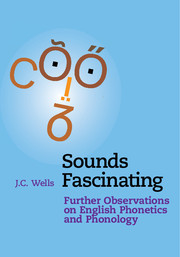16 - Lexical Stress
from PART III - APPLYING PHONETICS
Published online by Cambridge University Press: 05 September 2016
Summary
Prevalence
In English adjectives ending in the suffix -ant or -ent we still see the ghost of the Latin stress rule.
By this I mean that the word stress in such adjectives depends on how the stem to which the suffix is attached ends. (Obviously, we are dealing here with words of three or more syllables, i.e. with the suffix attached to a stem of two or more syllables.) If the stem ends in what Chomsky and Halle (The Sound Pattern of English, Harper & Row 1968) call a ‘weak cluster’, then the stress goes on the preceding syllable. If it ends in a ‘strong cluster’, then the stress goes on that syllable itself. A weak cluster consists of a short vowel followed by a maximum of one consonant. A strong cluster, on the other hand, has either a long vowel, or two or more following consonants, or both. So a weak cluster reflects a Latin single-mora (‘light’) syllable, while a strong cluster reflects a Latin multi-mora (‘heavy’) syllable.
The stress rule in Latin itself is: stress the penultimate if it is heavy (impeˈrātōr; conˈfectus, asˈcendō), otherwise stress the antepenultimate (conˈfĭcĭō, ˈrăpĭdus). Classicists call this the ‘Penultimate Law’ (W. Sidney Allen, Vox Latina, Cambridge University Press 1965, p. 83).
So in English we have on the one hand:
(i) ˈarrogant, belˈligerent, beˈnevolent, conˈstituent, ˈdecadent, ˈfumigant, perˈcipient, ˈpermanent, ˈreticent, sigˈnificant, ˈsubsequent
– with antepenultimate stress reflecting the Latin short vowel in rŏgō, gĕrō, vŏlō, etc; and on the other hand
(ii) exˈponent; abˈsorbent, aˈbundant, aˈstringent, correˈspondent, conˈvergent, inˈsistent, maˈlignant, reˈluctant
– with penultimate stress reflecting the Latin long vowel in pōnō and the consonant clusters in the other words.
In acquiescent and abhorrent the spellings sc and rr reflect what were consonant clusters in Latin, even though we now pronounce single consonants in English. In apparent the Latin vowel of appārĕō was long, even though we now pronounce it in BrE as short æ rather than as long eə. Conversely in provident Latin -vĭd- was short, generating antepenultimate stress, although we have a long vowel aɪ in provide.
- Type
- Chapter
- Information
- Sounds FascinatingFurther Observations on English Phonetics and Phonology, pp. 173 - 176Publisher: Cambridge University PressPrint publication year: 2016

